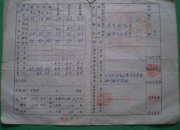《Go for it》说课稿
时间:2021-08-31一、教材解读:

本单元的中心话题是谈论过去发生的事情(talk about events in the past).这个话题非常贴近学生的生活实际。在这节课中,同学们学习并运用动词的过去式进行听、说、读、写、演等各项练习。教材中的对话包括一般过去时(the Simple Past Tense)的各种句式,对相关活动的设计及听力语言材料的选编都是为了让学生在真实有趣的情景中得到充分的练习。
二、教学设计依据:
热身部分(Warming-up activities)主要是激发学生的兴趣及热情。课前一首英文歌曲营造了学习英语的氛围。“热身”部分的重点是自由对话(Free talk)。根据学生对老师的情况很好奇的心理特点,设计了师生之间互问问题从而达到增进了解的目的,做到师生平等,形成和谐的课堂气氛,让学生在接下来谈论过去的活动中敢说、愿说。
操练部分(Drill)为呈现activity 1a而准备了一幅色彩鲜艳、内容丰富的沙滩图,创设了学校旅行(school trip)的情景,图中的活动都是学生熟知的、容易表达的活动。这种有情景的操练进一步巩固学生对动词过去式的掌握程度。
口语部分(Oral practice)分为三个环节。第一,引导学生表达自己这次学校旅行的感受。虽然这只是一个情景,但足以给学生留下美好的回忆。第二,运用沙滩图中的活动,引出本课的重点句型“Did you ……”,然后指导学生谈论他们已经做过的事情,在反复练习中掌握这个句型。第三,借助实物(oranges) 导入本课的另外一个句型“Where there any ……”。在学生得到充分练习之后,创新使用他们的学习用品进行交流。对于表现优秀的学生,应给予肯定,并将实物(oranges)作为奖品奖给他们以资鼓励。这三个环节的练习由简到繁,由易到难,采取不同方式,运用实物,联系实际,培养了学生的英语口语能力。
呈现部分(Presentation)是为下面的听力部分作准备。运用实物、图片及英语解释等多种方法呈现新单词及词组,而且口语部分已为要呈现的对话打下了坚实的基础。
听力部分(Listening Practice)做到循序渐进。首先带着问题听,然后边听边找出需要的信息,最后通过跟读、分角色朗读形成语感。此部分不再是听简单的单词发音,更重要的是听有意义的对话。
结对练习(Pairwork)设计了一个合作任务,主要是将所学知识系统地进行练习并加以总结创新。此时提供一幅书中的图画,利于全体学生观看。在说之前,让学生对图中的人名及活动有大致的了解;然后老师与几个学生示范对话,让学生明确任务;再给予他们足够的时间准备,以达到良好的教学效果。同时,在与同桌准备到表演的过程中,学生也学会了相互合作,并获得成就感与集体荣誉感。
整个教学过程力求做到环环相扣,过渡自然,对学生的各方面英语能力进行综合训练,培养学生运用英语表达思想、进行交际的能力。
Unit 6 I’m more outgoing than my sister
Section A
The First Period
Chen Dongfang Xinkai No.1 Middle School
Contents of teaching :
The comparison of two people
Teaching aims :
1. About the vocabulary:
Ss can understand and use the comparative degree of adjectives in this lesson.
2. About the communication skills:
Ss should be able to talk about personal traits and compare people.
3. About the English ability:
Make the Ss practice their listening, speaking, reading and writing comprehensive abilities.
Teaching focus and difficulties :
How to compare people.
Teaching aids :
Tape recorder, cassette, pictures, color Chalk, simple drawing
Teaching procedures :
Ⅰ. Warming-up activities :
1. Greetings and free talk.
2. A game Introduce myself.
Ⅱ. Presentation :
1. Draw a boy and a girl on the Bb. Get Ss to describe them and present the words in Activityla.
2. Tell Ss to write down the words on a piece of paper and match each word with the opposite. Check the answers and read the words.
3. Compare some Ss to present the comparative degree of adjectives.
Ⅲ. Oral practice :
1. Show the picture of Tom and Sam. Present “the twins” and the conversation. Then practice the conversation.
2. Show another two pictures. Help Ss to descn’be and compare the twins.
Ⅳ. Listening practice :
1. Listen and number the pictures [1-3]. Check the answers.
2. Listen and find out the two girls’ names. Put them on the picture.
3. Listen and repeat, then role play the conversations.
Ⅴ. Pairwork :
1. Two Ss read the model conversation.
2. The teacher makes one or two conversations with Ss.
3. Ss work in pairs. The teacher moves around the classroom and helps them if Ss need.
4. Some pairs of Ss act out in front of the Bb.
Ⅵ. Conclusion :
1. Divide the class in groups of four. Ss look at the picture on P31 and discuss the three pairs of twins. Write something about them.
2. Share the answers.
Writing on the blackboard :
Unit 6 I’m more outgoing than my sister
taller
longer
Tal wild bigger
thin short hair thinner
long hair heavy heavier
calm short funnier
simple
drawing
Tom has shorter hair than Sam.
=Sam has longer hair than Tom.
Tom is calmer than Sam.
=Sam is wilder than Tom.
Picture 1
Picture 2
Picture 3
Exercises
Exercises











